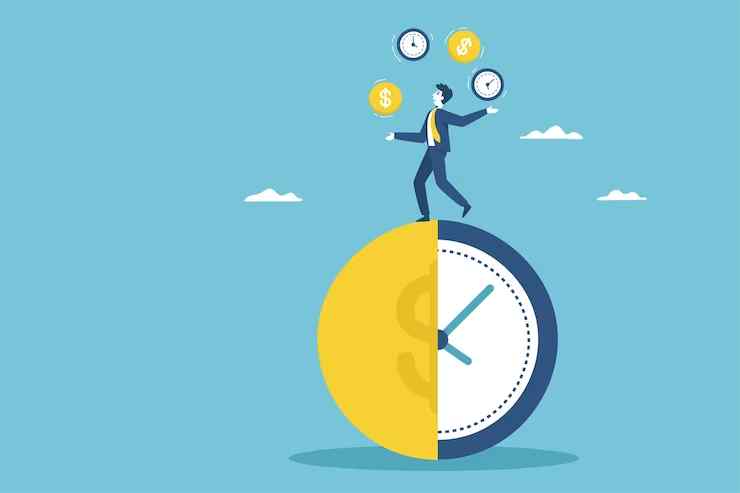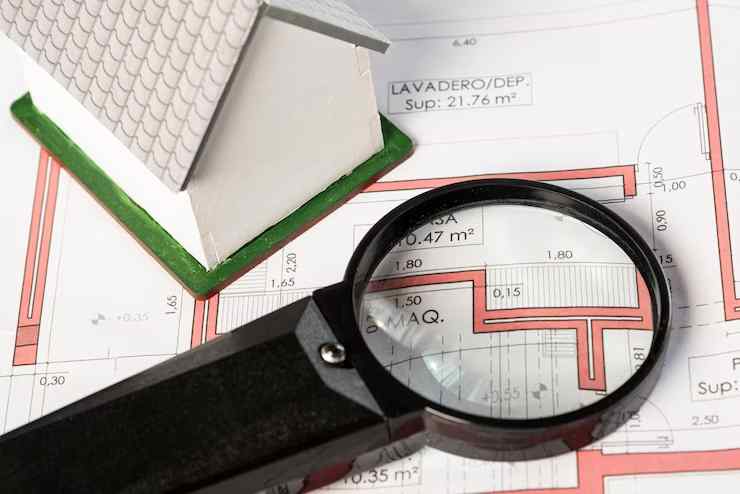Table of Contents
Quality Service Guarantee Or Painting Free

Get a rental agreement with doorstep delivery

Find the BEST deals and get unbelievable DISCOUNTS directly from builders!

5-Star rated painters, premium paints and services at the BEST PRICES!
Loved what you read? Share it with others!


Submit the Form to Unlock the Best Deals Today
Check Your Eligibility Instantly

Experience The NoBrokerHood Difference!
Set up a demo for the entire community

Tenant Super Relax Plan
Enjoy Hassle-Free Renting
 Full RM + FRM support
Full RM + FRM support Instant alerts & premium filters
Instant alerts & premium filters Rent negotiation & relocation help
Rent negotiation & relocation helpSubmit the Form to Unlock the Best Deals Today
Maximizing ROI Potential in Real Estate with Time Value of Money
Table of Contents
When considering real estate investments, it is crucial to understand the concept of the time value of money. This principle dictates that the value of money is not fixed, but rather changes over time due to various factors such as inflation, interest rates, and opportunity costs. As a result, money available today is generally considered to be more valuable than the same amount of money in the future.
When it comes to investing in real estate, the potential return on investment is heavily influenced by these factors. Different types of real estates, such as commercial and residential properties, offer varying levels of ROI potential due to factors like property size, location, and use.
Commercial real estate investments are generally considered to offer higher returns compared to residential properties, primarily due to longer leases and higher rental rates. However, investing in commercial properties also involves higher costs and barriers to entry. These factors must be carefully evaluated against an investor's financial goals, risk tolerance, and investment strategy to determine the optimal choice.
Quality Service Guarantee Or Painting Free

Get a rental agreement with doorstep delivery

Find the BEST deals and get unbelievable DISCOUNTS directly from builders!

5-Star rated painters, premium paints and services at the BEST PRICES!
The Importance of Understanding Financial Concepts in Real Estate Investments

As a seasoned investor, you understand that time is money when it comes to making informed decisions about your investments. Whether you're looking to buy a rental property or flip a home for a profit, understanding financial concepts will help you make smarter investment decisions. Here are some key concepts to keep in mind:
- Cash flow: It's the lifeblood of any investment property. Understanding how to calculate cash flow and how it impacts your bottom line is essential.
- Return on investment (ROI): This financial concept measures how much money you make relative to the amount you invested. It's a critical metric to track to ensure you're getting the most out of your investment.
- Capitalization rate: This is a financial ratio used to measure the profitability of an investment property. It's a key metric for evaluating the potential return on your investment.
- Debt-to-equity ratio: This ratio measures the amount of debt you have compared to the amount of equity in the property. It's an important indicator of financial health and can impact your ability to secure financing.
Application of Time Value of Money in Real Estate
The Time Value of Money (TVM) is a critical concept in real estate investing, as it impacts many aspects of the industry, including property valuation, mortgage financing, and lease negotiations.
- Property Valuation: TVM is used to determine the present value of a property's future cash flows. This helps investors estimate the current market value of a property, taking into account factors such as inflation, interest rates, and opportunity costs.
- Mortgage financing: TVM is used to calculate the monthly payments required to pay off a loan over a specific period. By considering the TVM, lenders and borrowers can negotiate interest rates and payment terms that are beneficial for both parties.
- Lease Negotiations: TVM plays a critical role in determining the lease rate and terms. The TVM concept is used to calculate the present value of the lease payments, taking into account inflation and other factors that may impact the value of the rental income over time.
The Impact of Inflation on Purchasing Power and Strategies for Mitigating Risks in Real Estate Investments

Inflation refers to the general trend of increasing prices for goods and services over a certain period, which ultimately decreases the purchasing power of a currency. For investors, inflation can have a significant impact on their purchasing power, as it reduces the value of their money and, therefore, their ability to buy goods and services.
When it comes to real estate investments, inflation can lead to higher costs for maintenance, property taxes, and other expenses, which can ultimately decrease the returns on investment. Additionally, inflation can lead to higher interest rates, which can make it more expensive to finance real estate investments, reducing the potential returns.
The strategies for mitigating inflation risks in real estate investments, such as diversification and inflation-indexed leases:
- Diversification of investments: Investing in a variety of real estate assets with different characteristics and in different geographic locations. This can help spread the risks across different investments and minimize the impact of inflation on the overall portfolio.
- Inflation-indexed leases: Use inflation-indexed leases, leases that are structured to adjust rental payments based on changes in inflation. This can help protect against the effects of inflation by ensuring that rental income keeps pace with rising costs.
The 6 Laws of Wealth
The "Six Laws of Wealth" is a set of principles that guide personal financial management. The six laws are:
- Save 10% of your income: Saving a portion of your income is essential to building wealth over time.
- Put your savings to work for you and invest it: Invest your savings in such a way that it will multiply. Investing in stocks, bonds, mutual funds, and real estate are some of the ways you can grow your wealth over time.
- Avoid debt as much as possible: The poor pay interest, while the rich earn interest. Avoiding debt can help you to build wealth over time by reducing the amount of money you have to pay in interest charges.
- Avoid speculating in get-rich-quick schemes: Instead invest in solid, long-term businesses. Investing in a business that has a proven track record and a solid business plan can help you to build wealth over time.
- Invest in yourself by gaining knowledge and skills: Investing in yourself will lead to an increase in your earning power. This can be achieved through education, training, and personal development.
- Safeguard your growing fortune: Diversification involves spreading your investments across different asset classes to reduce the risk of losing money in any one investment. Insurance provides protection against financial loss due to unexpected events like illness, accidents, or natural disasters.
Compounding Effect of Money
Compounding is the process by which the value of an investment increases over time as the earnings on the investment generate additional earnings, creating exponential growth. In the context of real estate investments, compounding can have a significant impact on long-term growth and returns.
The potential benefits of compounding in real estate investments include long-term growth and increased returns.
As the value of the investment grows over time, the potential for generating greater returns also increases. Additionally, reinvesting earnings from real estate investments into additional properties or upgrades can further amplify the effects of compounding.
The Power of Time
The earlier an investor begins to invest, the more time they have for compounding to work its magic. This is because the longer the investment period, the greater the potential for exponential growth. For example, if an individual invests in a real estate property and reinvests the earnings over a long period, they can achieve significant growth over time.
In conclusion, understanding the time value of money is crucial for making informed decisions in real estate investments. Time value of money accounts for the fact that money today is worth more than the same amount of money in the future due to its earning potential.
It involves calculating the present value of future cash flows, taking into account inflation and interest rates. By properly accounting for the time value of money, you can accurately assess the potential returns and risks associated with a real estate investment and make informed decisions about whether to invest or not.
FAQ's
A1: The three elements of the time value of money are present value, future value, and interest rate. Present value refers to the current value of a sum of money, while future value is the value of the same amount of money at a specific future date. The interest rate is the rate of return that an investor expects to earn on investment over time.
A2: The factors affecting the time value of money include the interest rate, inflation, and risk. The interest rate determines the return on investment and affects both present and future values. Inflation reduces the purchasing power of money over time, so it affects future value. Risks, such as credit risk or market risk, can affect the future value of an investment.
A3: The value of money in life is subjective and varies from person to person. Money provides individuals with the ability to meet their basic needs, such as food, shelter, and clothing. It also provides financial security and enables individuals to achieve their financial goals, such as buying a home, starting a business, or saving for retirement. However, money does not necessarily equate to happiness or well-being.
A4: The value of time versus money is subjective and depends on individual circumstances and priorities. Money can provide individuals with financial security and enable them to achieve their goals, but time is a non-renewable resource that cannot be replaced. For some individuals, time spent with loved ones or pursuing hobbies and interests may be more valuable than money.
A5: Current value refers to the value of a sum of money at present, while future value is the value of the same amount of money at a specific future date, taking into account the effects of interest or inflation. The current value can be calculated by discounting the future value using an appropriate discount rate, while future value can be calculated by compounding the present value with an appropriate interest rate.
A6: The relationship between interest rate and the value of money is inverse. As the interest rate increases, the value of money decreases because the future value of money decreases. Conversely, as the interest rate decreases, the value of money increases because the future value of money increases.
Loved what you read? Share it with others!
Most Viewed Articles

Secrets to Unlock Before Buying Your Dream Apartment
June 15, 2023
5654+ views

Unlocking IPO Potential: Strategies for Maximising Returns
June 13, 2023
5005+ views

Unlocking the World of Digital Assets: A Guide to Cryptocurrency and NFTs
March 21, 2023
4590+ views

Unleashing The Power Of Chakras Through Yoga And Meditation
April 25, 2023
4333+ views

Understanding the Tenant Selection Process
June 16, 2023
4176+ views
Recent blogs in
The Impact of Yearly Budget 2025-24 on Middle Class [A Comprehensive Analysis]
January 31, 2025 by NoBroker.com
Understanding the Tenant Selection Process
June 16, 2023 by NoBroker.com







Join the conversation!